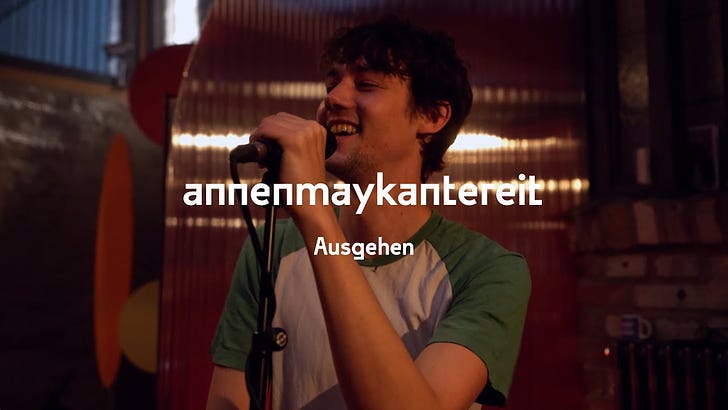Würdest du heute mit mir ausgehen?
Would you go out with me today? – “Ausgehen” by AnnenMayKantereit
I have to be honest – AnnenMayKantereit may be my favorite German band, and it might take some restraint on my part from turning this blog into a fan page for these former street musicians from Cologne. Stick around long enough, and you’ll see them again here for sure. Seeing them live in Erfurt this past March was an incredible experience and a milestone on my German-learning journey that I’ll never forget. (Shout-out to my sister-in-law, or Schwägerin, Elisabeth, who joined me there!)
“Ausgehen” was my first introduction to AnnenMayKantereit in early 2020, and it remains one of my favorites from the band. The song describes the experience of being interested in someone and asking them out in order to get to know them better. As an adept Youtube commenter points out, this “love song” for a woman praises her manner, her personality, and her goals, without mentioning her physical appearance – something not often seen in such songs.
In addition to the Proberaum Session (Practice Room Session) recording featured here, be sure to check out the band’s creative self-made original music video for “Ausgehen” as well.
Würdest du heute mit mir ausgehen?
Would you go out with me today?
Ich würd’ dich auch nach Haus bringen
I would also bring you home
Ich weiß, du musst früh aufstehen
I know that you have to get up early
Würdest du trotzdem mit mir ausgehen?
Even so, would you go out with me?
In German, politely expressing a wish or request, or describing an unreal or hypothetical situation, usually requires use of the Past Subjunctive, also known as Konjunktiv II. Rather than being a separate tense, the Subjunctive is described as a “mood” in German, meaning it can be applied to all verb tenses – present, past, future, etc.
The most common use of the Past Subjunctive is the past subjunctive form of the verb werden plus an infinitive. This is what we see in “Ausgehen”:
Würdest du heute mit mir ausgehen?
Would you go out with me today? (Wish, request)Ich würd(e) dich auch nach Haus bringen
I would also bring you home (Hypothetical situation)Würdest du trotzdem mit mir ausgehen?
Even so, would you go out with me? (Wish, request)
Here we can see all of the forms of werden for the present tense:
ich würde
du würdest
er/sie/es würde
wir würden
ihr würdet
sie/Sie würden
For more detailed information and exercises on the Subjunctive / Konjunktiv, check out this article from Lingolia.
And for a grammar bonus: “Ausgehen” also features clear examples of the adverbs deswegen (therefore) and trotzdem (regardless, nevertheless):
Ich glaub(e), ich mag die Art
I think I like her manner
Deswegen hab(e) ich sie gefragt
And so (therefore, because of this) I asked herIch weiß, du musst früh aufstehen
I know that you have to get up early
Würdest du trotzdem mit mir ausgehen?
Even so (regardless), would you go out with me?
Here are a few additional words from “Ausgehen” to add to your vocabulary list:
genau – exactly
die Art – the way, the manner
deswegen – therefore, because of this
ausgehen – to go out
aufstehen – to get up / to wake up
trotzdem – regardless, even so
am Start – ready to go
das Ziel / die Ziele – the goal
naja – well / oh well
zum Glück – luckily



